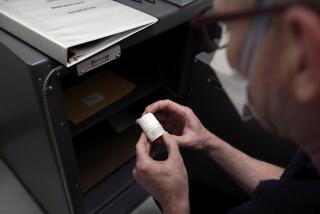EPA listens to lobbyists, boots expert
Under pressure from the chemical industry, the Environmental Protection Agency has dismissed an outspoken scientist who chaired a federal panel responsible for helping the agency determine the dangers of a flame retardant widely used in electronic equipment.
Toxicologist Deborah Rice was appointed chairwoman of an EPA scientific panel reviewing the chemical a year ago. Federal records show she was removed from the panel in August after the American Chemistry Council, the lobbying group for chemical manufacturers, complained to a top-ranking EPA official that she was biased.
The chemical, a brominated compound known as deca, is used in high volumes worldwide, largely in the plastic housings of television sets.
Rice, an award-winning former EPA scientist who now works at the Maine Department of Health and Human Services, has studied low doses of deca and reported neurological effects in lab animals. Last February, about the time the EPA panel was convened, Rice testified before the Maine Legislature in support of a state ban on the compound because scientific evidence shows it is toxic and accumulating in the environment and people.
Chemical industry lobbyists say Rice’s comments to the Legislature, as well as similar comments to the media, show that she is a biased advocate who has compromised the integrity of the EPA’s review of the flame retardant.
The EPA is in the process of deciding how much daily exposure to deca is safe -- a controversial decision, expected next month, that could determine whether the chemical can still be used in consumer products. The role of the expert panel was to review and comment on the scientific evidence.
EPA officials removed Rice because of what they called “the perception of a potential conflict of interest.” Under the agency’s handbook for advisory committees, scientific peer reviewers should not “have a conflict of interest” or “appear to lack impartiality.”
EPA officials were not available for comment Thursday.
Environmentalists accuse the EPA of a “dangerous double standard,” saying that under the Bush administration, many pro-industry experts have served on the agency’s scientific panels.
The Environmental Working Group, a Washington-based group, reviewed seven EPA panels created last year and found 17 panelists who were employed or funded by the chemical industry or had made public statements that the chemicals they were reviewing were safe. In one example, an Exxon Mobil Corp. employee served on an EPA expert panel responsible for deciding whether ethylene oxide, a chemical manufactured by Exxon Mobil, is a carcinogen.
Sonya Lunder, a senior analyst at the Environmental Working Group, called it “deeply problematic from the public interest perspective” for the EPA to dismiss scientists who advocate protecting health while appointing those who promote industry views.
“It’s a scary world if we create a precedent that says scientists involved in decision-making are perceived to be too biased,” she said.
Rice was unavailable for comment Thursday.
In May, Sharon Kneiss, a vice president of the American Chemistry Council, wrote a letter to an assistant administrator at the EPA calling Rice “a fervent advocate of banning” deca and saying she “has no place in an independent, objective peer review.” Kneiss told the EPA that Rice’s role on the panel “calls into question the overall integrity” of the agency’s evaluation of chemicals and that Rice may have influenced the other panelists in their review of deca.
Top EPA officials met with the industry group’s representatives in June and promised to take action, according to a letter that EPA Assistant Administrator George Gray sent to the group last month. In that letter, Gray said the EPA found “no evidence” that Rice “significantly influenced the other panelists.”
After EPA officials dismissed her from the five-member panel, they removed her comments from the panel’s report on deca and removed all mention of her. Three months later, at the request of the chemical industry group, the EPA added a note to the panel report that Rice was removed “due to a perception of a potential conflict of interest” and that none of her comments were considered in their review of the chemical.
EPA documents show that Rice’s comments while serving on the panel focused on technical, scientific issues.
Rep. Henry A. Waxman (D-Beverly Hills), chairman of the House Committee on Oversight and Government Reform, said he was disturbed by Rice’s dismissal and the Environmental Working Group’s findings about pro-industry panelists.
“If this information is accurate, it raises serious questions about EPA’s approach to preventing conflicts of interest on its expert scientific panels,” Waxman said.
Rice specializes in neurotoxins -- chemicals that harm developing brains. Before she went to work for Maine, she was a senior toxicologist at the EPA’s National Center for Environmental Research, where she had a major role in setting the EPA’s guideline for exposure to mercury in fish.
In 2004, the EPA gave Rice and four colleagues an award for what it called “exceptionally high-quality research” for a study that linked lead exposure to premature puberty in girls.
--
More to Read
Sign up for Essential California
The most important California stories and recommendations in your inbox every morning.
You may occasionally receive promotional content from the Los Angeles Times.










